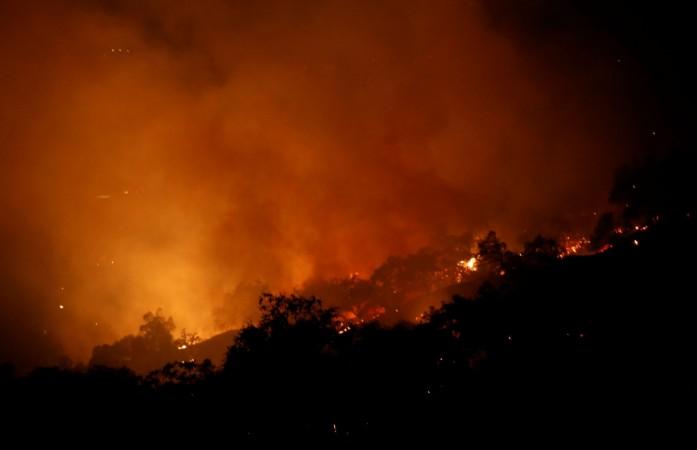Fire officials in Northern California reported further headway on Friday against the most lethal outbreak of wildfires in state history, as the death toll rose to 35 and teams with cadaver dogs combed charred ruins for human remains.
The wind-driven blazes, which erupted on Sunday night in the heart of California's renowned wine country, north of San Francisco, have destroyed an estimated 5,700 homes and businesses and forced the evacuation of at least 25,000 people.
With more than 200 people still missing on Friday in Sonoma County alone, and rubble from thousands of incinerated dwellings yet to be searched, authorities have said the number fatalities from the so-called North Bay fires would likely climb higher.
Even as firefighters gained more ground during a second day of better weather, they braced for a return of higher temperatures, lower humidity and strong, gusty winds that could increase the threat to communities still in harm's way.
Ground crews raced to clear drought-parched vegetation along the southern flanks of fires, removing highly combustible fuels adjacent to populated areas before extreme heat and winds were forecast to revive over the weekend.

"We've challenged the troops to get out there and secure mainly the south parts of these fires in preparation for those strong north winds," Bret Gouvea, deputy chief of the California Department of Forestry and Fire Protection (Cal Fire), told a news conference.
As of Friday afternoon, 17 major wildfires — some encompassing several smaller blazes merged together — had consumed nearly 222,000 acres of dry brush, grasslands and trees across eight counties.
Governor Jerry Brown planned to visit the area with California's two US senators on Saturday.
Officials have said power lines toppled by gale-force winds the first night may have sparked the conflagration, though the official cause remained under investigation.
Much of the devastation centered in and around the Sonoma County town of Santa Rosa, where whole neighbourhoods were reduced to landscapes of gray ash, smouldering debris and burned-out vehicles.
Some victims were asleep when flames engulfed their homes, and many survivors had only minutes to flee.
Resort in danger
The picturesque town of Calistoga, at the northern end of Napa Valley, faced one of the biggest remaining hazards. Its 5,000-plus residents were ordered from their homes on Wednesday night as a fierce blaze dubbed the Tubbs fire crept to within 3.2 km of city limits.
On Friday evening, fires raged along mountain ridges overlooking Calistoga, threatening to rain embers onto the town if strong winds blow out of the north as predicted, Cal Fire spokesman Dennis Rein said.
A resort and spa destination dating from the mid-1800s, Calistoga is famed for its mud baths, hot springs, geysers and a historic Western-style downtown.
The enclave is surrounded by vineyards and wineries, upscale hotels and even a replica of a medieval Italian castle, Castello di Amorosa, one of its best known attractions.
The 35 confirmed fatalities — 19 in Sonoma County — mark the greatest loss of life from a single fire event on record in California, surpassing the 29 deaths from the Griffith Park fire of 1933 in Los Angeles.

Sonoma County Sheriff Robert Giordano said his office had investigated nearly 1,500 missing-persons reports stemming from the fires, and all but 235 had since turned up safe as of Friday evening.
Disruptions in communications and the failure of many evacuees to promptly check in with authorities or loved ones accounted for the overwhelming majority of individuals initially reported missing, authorities said.
Still, Giordano said 45 search-and-rescue teams and 18 detectives had been deployed to scour obliterated neighbourhoods for more victims.
Finding shelter
At a fairground converted to a shelter in the nearby city of Petaluma, about 250 cots were full by Friday, and people slept in tents in the parking lot as volunteers served porridge and eggs for breakfast.
Yasmin Gonzalez, 28, her four children and husband, a grape picker, were anxious to leave the shelter and return to their apartment in Sonoma.
"It's horrible to leave your home, and your things and not know what's going to happen," Gonzalez said.
The region's health system has also been weakened by the fires. Kaiser Permanente was forced to close its Santa Rosa medical centre and pharmacy, and many doctors and small practices evacuated. Kaiser said on Friday that it was rerouting patients, some of whom complained of respiratory ailments as a result of smoke, to nearby medical centres.

At least 40 Sonoma County physicians have lost their homes in the fires, leaving the county medical association to seek alternative accommodations for them, agency director Wendy Young said.
The year's wildfire season is one of the worst in history in the United States, with nearly 8.6 million acres burned, just behind 2012, according to the National Interagency Fire Centre.
In the worst year, 2015, about 9.3 million acres burned.
The fires have thrown California's wine-producing industry, and related tourism, into disarray at the end of the region's annual grape harvest, damaging or destroying at least a dozen Napa Valley wineries.
The state's newly legalised marijuana industry was also hit hard, with at least 20 pot farms in Sonoma, Mendocino and Napa counties ravaged, a growers' association said.









